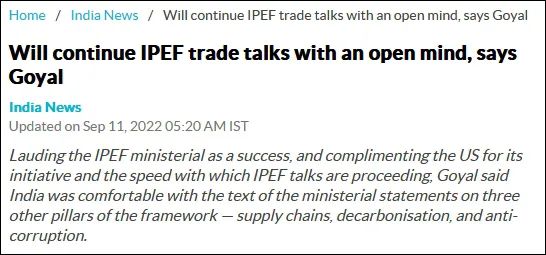India is called "no good", and you have to go
Author:Global Times Time:2022.09.12
A few days ago, the "Indo -Pacific Economic Framework" (IPEF) led by the United States ended the two -day offline ministerial talks. However, India, as the "key part of the framework", announced that after the meeting, on the grounds of "temporarily not seeing good", it was announced that it temporarily withdrew from the negotiations in the trade field of one of the four pillars of the framework and became the only member who did not participate in all field negotiations. country.

Screenshot of the Indian Stan Times report
From September 8th to 9th local time, IPEF's first round of ministerial conferences held in a face -to -face form ended in Los Angeles, USA. The joint statement issued after the meeting stated that 14 member states jointly passed the main goals of the four pillar cooperation of trade, supply chain, cleaning economy and fair economy in the framework, and will start a formal negotiations.
However, India did not mention the statement of cooperation in the field of trade after the meeting, and the press release of the Indian Ministry of Commerce and Industry also pointed out that India will make decisions on the different aspects of IPEF according to its national interests.
Based on the "Indian Stan Times" and India's newspaper Trust, the Minister of Commerce and Industry of India has bluntly stated to the media that India does not see any benefits in this regard.

Indian Commercial Minister Goria (left) at the media briefing. Image source: India Newspaper Toras
"The outline of the framework, especially in the environment, any promise required for environmental, labor, digital trade and public procurement, is some areas that countries have not reached a wider consensus." Goyal said, "We have not seen all countries yet. What benefits will be obtained (from all aspects of the trading pillar), and whether any conditions in the environment (applied) may discriminate against developing countries. "
Giar also said that India is currently determining its own rules and regulations in the digital economy and data privacy.
The Financial Express (The Financial Express) pointed out that IPEF's commitment to make a member state in terms of trade is more "sensitive" for India, and the Indian government has recently withdrawn a personal data protection bill from the parliament to introduce a one "More comprehensive legal framework", it is difficult for New Delhi to make any binding commitments on these issues in the talks, especially when the details of any such framework are still rough.
Gial added that India will continue to contact the framework as an observer to wait for the "final outline" to wait for the "final outline" of the trade pillar, and then decide whether to join.
According to Bloomberg, the official briefing released by the United States on the 9th explained that this represents the flexibility of IPEF. US trade representative Dai Qi said that the United States will continue to negotiate bilateral trade with India, and she will not define India's current decision as "choosing to withdraw". Daiqi also revealed that she would meet with Gial by the end of this year.
According to the Indian Stan Times, a person familiar with the development of the situation said that the discussion in the IPEF has always been "kind" and India's decision has not caused any quarrel. "This is just the first ministerial meeting, the beginning of the process, not the end; it is wrong to judge India's commitment to trade by this decision." The report wrote.
It is worth mentioning that India had previously selected the "RCEP" (RCEP) at the last moment because of the protection of domestic industrial and agricultural and other factors.

IPEF officially launched during the visit to Japan in May this year. This is the latest measure taken by the United States after the United States withdrawn from the Cross -Pacific Partnership Agreement (TPP) in 2017 to strengthen the economic and trade relations with the Asia -Pacific countries. Conversion of regional influence that China is constantly increasing. The framework currently has 14 member states such as the United States, India, Japan, and South Korea, accounting for 40%of the world's GDP. Taiwan has said that he is interested in joining the framework, but has not been accepted.
According to the currently announced content, the iPEF plans to cooperate around the four pillars of trade, supply chain, cleaning economy, and fair economy, and countries can choose to participate in areas. In terms of trade, the framework states that participants will cooperate on issues such as digital economy, emerging technology, labor standards, environmental protection, trade facilitation, and regulatory transparency, and make commitments with high standards, tolerance, freedom, and fairness. For example, in the field of digital economy, international rules for the use of cross -border data flow, localization, online privacy, and artificial intelligence will be discussed.
Regarding the U.S. ’s IPEF, Chinese Ministry of Foreign Affairs spokesman Wang Wenbin once said that China’ s same regional countries are like the initiative that is conducive to strengthening regional cooperation, but it opposes the creation of division and confrontation. China believes that regardless of the regional cooperation framework of the name destination, it should promote free trade. It should not be protected in disguise. It should help the world economic recovery. It should not undermine the stability of the industry chain. The United States should do things in accordance with the rules of free trade, rather than starting a stove and engaging in another set, impacting the current regional cooperation structure, and opening a regional integrated reverse.
Wang Wenbin pointed out that artificially manufacturing economic decoupling, technological blockade, and industrial disconnection, exacerbating the supply chain crisis, will only bring serious consequences to the world, and the United States cannot exception.The United States should know the mistakes, not wrong.The success of the Asia -Pacific success is a win -win cooperation, not zero -sum confrontation.Asia -Pacific should become a highland of peaceful development, not a duel on geopolitics, in an attempt to make the Asia -Pacific camp, NATO, and cold war. It is impossible to succeed.Trying to get a framework to isolated China, and in the end it will only beolate yourself.Source: Observer Net Yang Rong
- END -
Teacher's style | Huaihua Normal University Wu Rong: Huai Hui dreams, travel along the way

Wu Rong was evaluated by the school's outstanding teacher33 years ago, she had a s...
People's Daily Overseas Version Follow Jilin: Qingshan Evergreen Tiger and Leopard Born

Qingshan Evergreen Tiger and Leopard Best—— Jilin Province Construction of North...